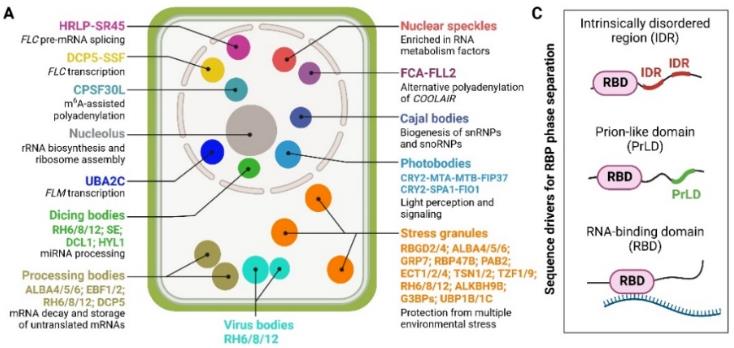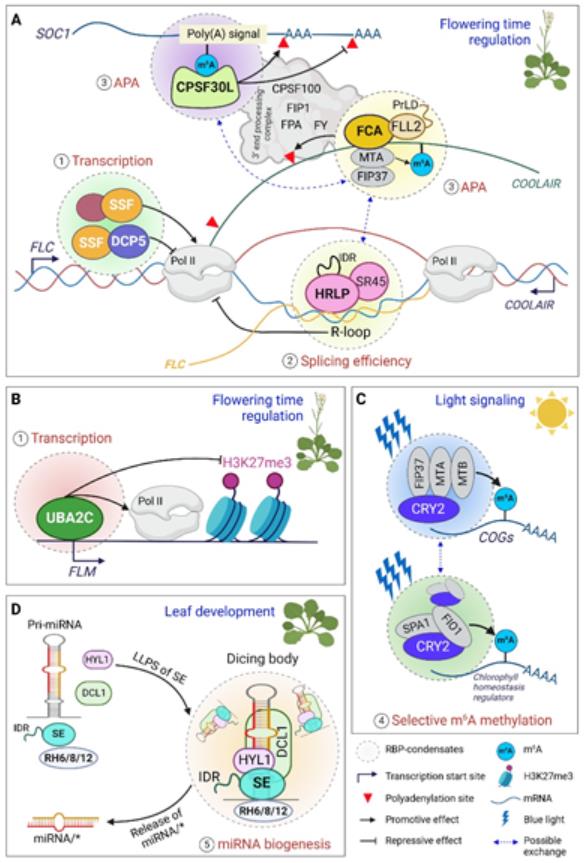Liquid-liquid phase separation (LLPS) of proteins regulates the growth and development of eukaryotes, participates in biotic and abiotic stress responses, and affects biological processes such as gene expression, signal transduction, and translation initiation. Studies have shown that RNA-binding proteins (RBPs) have LLPS properties, and RBPs rely on their unique structural domains to form condensates to regulate RNA metabolism. On February 27, 2024, Lisa Shen's research group at National University of Singapore published a review paper titled "Plant RNA-binding proteins: phase-separation dynamics and functional mechanisms underlying plant development and stress responses" online at Molecular Plant, which systematically summarized the latest research progress of plant RBPs in LLPS. This article explains the formation of RBPs condensates, the identification method of binding to RBPs-RNA, the involvement of RBPs-mediated LLPS in multiple processes such as biological growth and development and stress response, discusses the multiple factors affecting LLPS, and looks forward to the future application prospects of LLPS.
RBPs are one of the main factors that regulate RNA fate and are involved in RNA synthesis, splicing, polynylation and translation. RBPs play an important role in plant growth and development and response to biotic and abiotic stresses. Intrinsically disordered regions (IDRs) in RBPs are important regions of LLPS. RBPs aggregate within cells through IDRs or other structural domains. The aggregates formed by RBPs mainly include: nuclear speckles, dicing bodies (D-bodies), Cajal bodies, photobodies, processing bodies (PBs) and stress granules (SGs), etc.

The authors compared multiple methods for identifying RNAs that bind to RBPs, including RIP-seq, CLIP-seq and TRIBE-based RNA editing technologies. At the same time, the functions of LLPS in biological processes such as mRNA metabolism, RNA modification, and miRNA synthesis are systematically summarized; and how they participate in various processes that affect plant flowering, leaf development, and stress response. Through LLPS, candidate RBPs such as HLRP, SR45, UBA2c, and FCA form condensates in specific regions and participate in the precise regulation of plant flowering processes. Similarly, under external environmental stimulation, RBPs form PBs or SGs in the nucleus or cytoplasm. RBPs such as RBGD2/4, ALBA4/5/6 and ECTs quickly respond to changes in the growth environment by forming specific condensates in the nucleus or cytoplasm. These condensates exert specific biological functions on the mRNA entering SGs or PBs in response to various stress responses by affecting translational degradation, storage protection, or affecting enzyme activity.

LLPS involving RBPs is controlled by multiple factors, including environmental stimuli, post-translational modifications (PTMs), and mRNA modifications. Furthermore, the author comparatively analyzed the current research status of PTMs involved in LLPS. Whether the sites modified by PTMs exist in the structural region of LLPS and whether PTMs affect the LLPS of RBPs are still biological issues that need to be focused on. At the same time, the author analyzed the impact of m6A RNA modification on LLPS, and discussed the prospects of other RNA modifications such as m1A in LLPS involving RBPs.
Finally, the author compared RBPs among eight species including Arabidopsis, rice, and corn, and proposed that LLPS is a conserved spatiotemporal fine-regulation mechanism. By taking Arabidopsis thaliana as a clue, the theoretical basis of RBPs-mediated LLPS in botanical research is pointed out, and it can be used as a candidate gene for future crop genetic improvement and breeding.
Reference:
Fan, S., et al. Plant RNA-binding proteins: phase-separation dynamics and functional mechanisms underlying plant development and stress responses. Mol Plant. 2024 Feb 27: S1674-2052(24)00072-8.